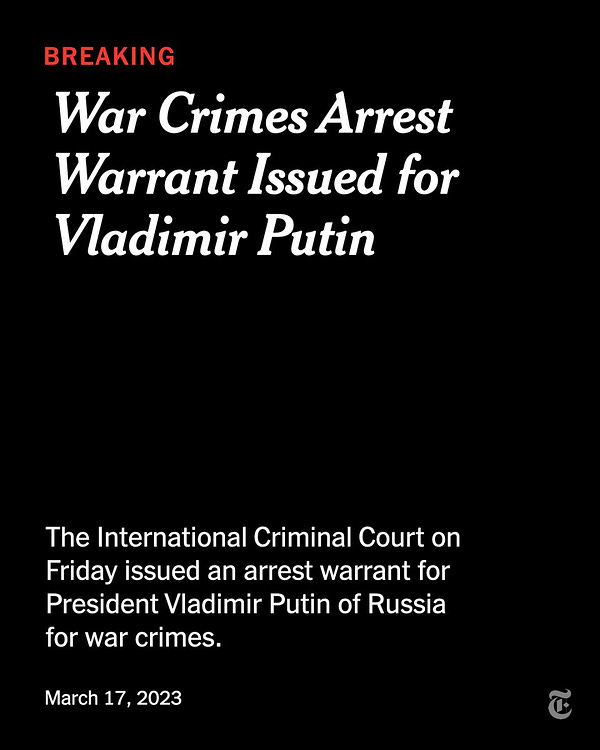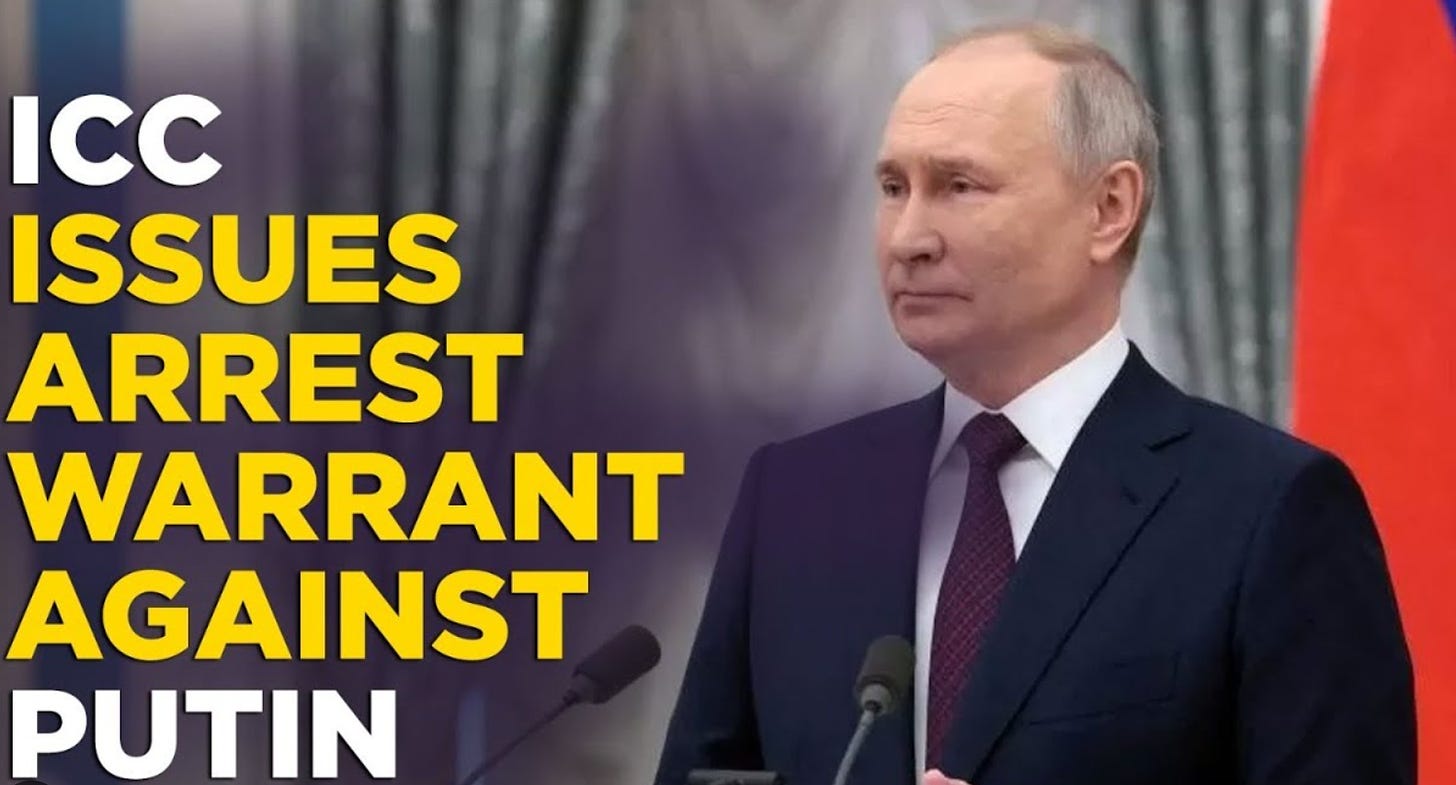Breaking News: The International Criminal Court issued an arrest warrant for President Vladimir Putin of Russia for war crimes.
Examining the Implications and Consequences of the ICC's Landmark Decision


Introduction
Good day, fellow adventurers of the technological frontier. Today, we are gathered here to discuss a matter of great importance that has just come to my attention. The International Criminal Court has made a groundbreaking announcement that has sent shockwaves across the globe. The court has issued an arrest warrant for none other than President Vladimir Putin of Russia for war crimes. This news is truly unprecedented and carries far-reaching implications that we must explore in depth. As we delve into this matter, let us approach it with the spirit of innovation and a thirst for knowledge. Together, we will examine the details of this development and contemplate its impact on our world.
Background
Before we proceed any further, let us take a moment to reflect on the background of the International Criminal Court and its significance. As you may already know, the ICC is a court of last resort that was established to prosecute individuals for the most heinous crimes that threaten the peace, security, and well-being of the world. The ICC has jurisdiction over genocide, crimes against humanity, war crimes, and crimes of aggression. Its purpose is to hold perpetrators accountable for their actions and to bring justice to the victims of these crimes.
Now, let us turn our attention to the specific allegations of war crimes that have been leveled against Russian forces in Ukraine and Syria. These allegations include indiscriminate bombing of civilian areas, the use of prohibited weapons, and the targeting of hospitals and other essential infrastructure. These actions are in clear violation of international law and have caused untold suffering to innocent people.
As we move forward in our discussion, it is essential to keep in mind the gravity of the situation and the importance of the ICC's decision to issue an arrest warrant for President Putin. This is not a matter to be taken lightly, and we must approach it with the utmost seriousness and respect for the rule of law.
Details of the Arrest Warrant
Now, let us turn our attention to the details of the arrest warrant issued against President Putin by the International Criminal Court. The charges against President Putin include crimes against humanity and war crimes committed by Russian forces in Ukraine and Syria. The evidence presented by the ICC is compelling and suggests that these crimes were committed on a large scale and were part of a systematic campaign of violence against innocent civilians.
The process of issuing an arrest warrant is not one that is taken lightly. The ICC is a respected institution that adheres to strict rules and procedures, and its decisions are based on rigorous analysis of the facts and the law. When an arrest warrant is issued, it carries significant weight and has implications for the accused, as well as for the country they represent.
It is important to note that an arrest warrant does not necessarily mean that the accused will be apprehended or brought to trial. However, it does signal a willingness by the international community to hold individuals accountable for their actions and to uphold the principles of justice and human rights.
As we contemplate the details of this arrest warrant, we must keep in mind the importance of respecting the rule of law and the need for justice to be served. We must also consider the potential impact that this decision will have on the international community and on the relationship between Russia and the rest of the world.
Reaction from Russia and the International Community
The reaction from Russia and the international community to the ICC's decision to issue an arrest warrant for President Putin has been swift and varied. From the Russian government, there has been a strong denial of any wrongdoing and a condemnation of what they view as a politically motivated decision. Some Russian officials have even gone so far as to suggest that the ICC has exceeded its mandate and has no jurisdiction to make such a decision.
In the international community, there has been a range of reactions to the news. Some countries have expressed support for the ICC's decision and have called for accountability for the alleged war crimes committed by Russian forces. Others have been more cautious in their response, citing concerns about the potential implications of the decision for international relations and the need for diplomacy and dialogue to resolve conflicts.
Regardless of the reaction, one thing is clear: the decision by the ICC to issue an arrest warrant for President Putin is a significant development that will have far-reaching implications. It is a reminder that no one is above the law and that individuals who commit crimes against humanity and war crimes will be held accountable for their actions.
As we move forward, we must continue to engage in thoughtful dialogue and diplomacy to resolve conflicts and promote peace and justice. We must also recognize the importance of respecting the rule of law and the role that institutions like the ICC play in upholding it.
Implications and Consequences
The implications and consequences of the ICC's decision to issue an arrest warrant for President Putin are significant and multifaceted. Firstly, it sends a powerful message to the international community that crimes against humanity and war crimes will not be tolerated, and that those responsible will be held accountable for their actions. This decision sets a precedent for future cases and underscores the importance of the ICC as a court of last resort for prosecuting the most serious crimes.
However, the decision also has potential consequences for the relationship between Russia and the rest of the world. The Russian government has already expressed its vehement opposition to the decision and has suggested that it may lead to a further deterioration in relations with other countries. This could have significant implications for global security and stability, particularly given Russia's role as a major player on the world stage.
Furthermore, the decision also raises questions about the effectiveness and legitimacy of international law and institutions. Some critics have suggested that the ICC's decision is politically motivated and that it may not be able to enforce the arrest warrant against President Putin. Others have raised concerns about the potential for the decision to be used as a tool for political leverage or coercion.
As we grapple with these implications and consequences, we must continue to prioritize the principles of justice, accountability, and the rule of law. We must also recognize that there are no easy solutions to complex global issues and that we must engage in ongoing dialogue and collaboration to promote peace and security for all.
Conclusion
In conclusion, the decision by the International Criminal Court to issue an arrest warrant for President Putin is a significant development that has far-reaching implications for the international community. While the decision sends a powerful message about the importance of accountability for crimes against humanity and war crimes, it also raises questions about the effectiveness and legitimacy of international law and institutions.
As we move forward, it is essential that we continue to prioritize the principles of justice, accountability, and the rule of law. We must also recognize that promoting peace and security on a global scale requires ongoing dialogue, collaboration, and a commitment to finding diplomatic solutions to complex problems.
Ultimately, we are all part of a shared global community, and it is our responsibility to work together to create a safer, more just, and more peaceful world. By upholding these values and working towards these goals, we can build a brighter future for ourselves and for generations to come.



